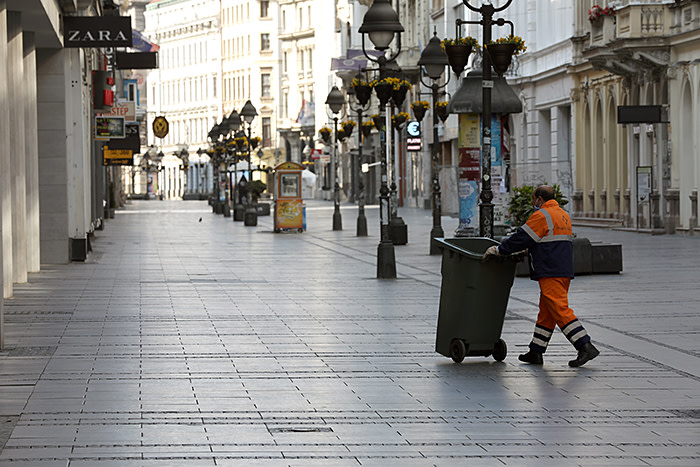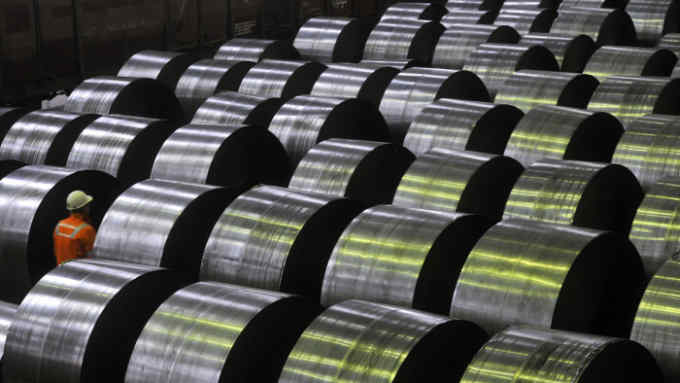Serbia’s path to EU strewn with missteps and some members’ doubts

Roula Khalaf, Editor of the FT, selects her favourite stories in this weekly newsletter.
The EU’s gradual recovery from the sovereign debt and banking crises of a decade ago had a positive impact on the Serbian economy. Trade and investment relations blossomed. Serbia began to acquire a reputation for macroeconomic stability.
Nevertheless, slow progress on other, essential areas of domestic economic and political reform has had serious implications. By the start of 2020, Serbia remained a long way from its professed goal of full EU membership.
The coronavirus pandemic is putting the EU-Serbian relationship to the test in new ways. Early in the emergency, President Aleksandar Vucic caused surprise in some western European capitals with his praise for China and apparent scorn for the EU in accusing the bloc of a lack of solidarity with the western Balkans.
Dusan Reljic, head of the Brussels office of the German Institute for International and Security Affairs, comments: “The EU’s ability to assert itself in the western Balkans, and especially in the largest and most politically important state in the region, Serbia, seems to have weakened since the outbreak of the pandemic.”

Despite the decision in March to open accession talks with Albania and North Macedonia, some EU governments, notably that of France, are not convinced that at least some western Balkan countries should ever become full EU members. This has not prevented the European Commission, the EU’s executive body, from seeking to demonstrate its long-term commitment to Serbia and other regional states, in the face of geopolitical competition not only from China, but also from Russia and Turkey.
In May, it announced a €3.3bn EU support plan for the western Balkans. Apart from possible preferential loans from the European Investment Bank, Serbia was to receive €93.4m as an “economic reactivation package”, €78.4m for social and economic recovery and €15m in support for the health sector.
However, these funds may barely compensate for an expected decline in export revenues due to a collapse in EU demand for Serbian products.
There is also a risk of disruption to manufacturing supply chains involving EU companies with operations in Serbia. The Fiat Chrysler car plant in Kragujevac halted production in February because of a lack of Chinese components, although may reopen later this month.
The larger concern is that the pandemic will subject Serbia’s health system, government finances and industrial base to pressures so intense as to stall advances made in the 2010s towards meeting EU standards — especially so in areas like public administration, state aid and competition policy.
Despite recording far fewer cases of infection and death from Covid-19 than west European countries, Serbia felt it necessary to impose a lockdown that stretched its relatively under-resourced social security and unemployment benefits. Incomplete official statistics make it difficult to calculate the impact on employment, but job losses are much higher than the 4,300 people who had registered as unemployed by April 7. One priority, as Serbia sets about recovery from the pandemic, will be how to stimulate domestic investment.
In “Serbia’s New Growth Agenda”, a report published in December, the World Bank estimated that Serbia could double its national income in 10 years by embracing reforms that would lift its pre-pandemic economic growth rates to 7 per cent a year from 3-4 per cent. But this would require raising public investment to at least 5 per cent of GDP, helping private sector investment to rise above 20 per cent of GDP, and pursuing other reforms aimed at increasing productivity, promoting exports and improving business regulations. As the largest overall foreign investor in Serbia, the EU has a role to play in this.
Serbia’s path to EU accession, which began in 2012 when it received the status of candidate country, has been laborious and by no means uncontested — in its own political arena and in some EU national capitals. Six years since its membership talks began, Serbia has opened 18 of the 35 negotiating chapters, or policy areas, but provisionally completed only two — on science and research, and education and culture.
The biggest obstacles to progress are the failure to settle differences with Kosovo, the ethnic Albanian-majority state that declared independence from Serbia in 2008, and the quality of the rule of law — a factor intimately connected in EU eyes both to democratic values and to a flourishing, competitive economy. Like Montenegro, Serbia is, at least nominally, further down the road to EU entry than its western Balkan neighbours, Albania, Bosnia and Herzegovina, Kosovo and North Macedonia. However, Vladimir Bilcik, a centre-right Slovak politician who is the European Parliament’s rapporteur on EU-Serbian relations, cautioned in November against raising hopes too high.
“I think that the only credible and sustainable future of the western Balkans is in the European Union,” Mr Bilcik told European Western Balkans, a Belgrade-based web portal. “The positions of Serbia and Montenegro are very similar, because they are only at the start of fulfilling the difficult task of domestic reforms, which we in the European Union expect the two countries to deliver,” he added.
EU policymakers are particularly concerned about the perceived inclination of Serbia’s leaders to play off Brussels against other powers, especially China and Russia, in their search for political advantage at home. “Authorities should put more emphasis on objective communication about the EU, which is Serbia’s main political and economic partner,” a Commission report said last year. “Serbia’s strategic choice of EU accession needs to be more actively and unambiguously communicated in the public debate.”

Comments